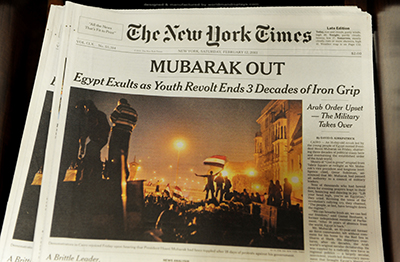The international media depend on the U.S. press to cover U.S. stories–and many of these, from the subprime mortgage crisis to NSA surveillance, are global stories because of their worldwide repercussions. But international journalists also rely on the U.S. press to report and comment on most world events. Therefore any restriction on U.S. journalists’ freedom to report inevitably reverberates around the globe.
Indeed, the U.S., through a multiplicity of actors–the government, the military, transnational corporations, and NGOs– plays a major role on the international scene, from the Syrian crisis to climate change negotiations and the global war on drugs. The American press is not only the first source of information on U.S. policies related to these global challenges but also an indispensable provider of facts, opinions, and images on the issues themselves.
Read the special report
• Obama and the Press
In print
• Download the pdf
In other languages
• Español
• Português
This role is particularly crucial–and highly appreciated–when U.S. journalists live up to their legend as dogged muckrakers and vigilant watchdogs, uncovering policies and actions that the U.S. government or other national or international actors would rather keep secret.
The U.S. press’ global influence is a reflection of U.S. power, but its international reputation is grounded in its audacity and its independence to report on authorities and hold them to account “without fear of favor,” in the words of Adolph S. Ochs, founding father of the modern New York Times. In fact, whereas the Obama administration seems to consider the U.S. press a potential threat to national interests, this concept of journalism as a Fourth Estate strongly contributes to U.S. soft power around the world. The impact of the U.S. administration’s umbrageous attitude toward the press undermines the image of a democratic model based on robust checks and balances and in particular on a press that dares speak truth to power.
The sneaky surveillance and prosecution of journalists in the search for leakers have a global cost. By disproving that U.S. journalists cannot be forced to go to court or to jail because they published something that embarrasses government officials, these actions provide easy alibis for enemies of a free press in authoritarian states and weaken the U.S. commitment to defend press freedom and embattled journalists everywhere. They also threaten to reduce the U.S. media’s freedom to report on issues of global interest and therefore restrict the news flows feeding the international media.
“All the (world) press is our press,” wrote Columbia University President Lee C. Bollinger in his 2010 landmark essay Uninhibited, Robust, and Wide-Open. A Free Press For a New Century (Oxford University Press, 2010). “All the U.S. press is our press,” echo international journalists who know they depend on their U.S. colleagues to provide, in the famous words of the 1947 Hutchins Commission, “a truthful, comprehensive, and intelligent account of the day’s events in a context which gives them meaning.”
